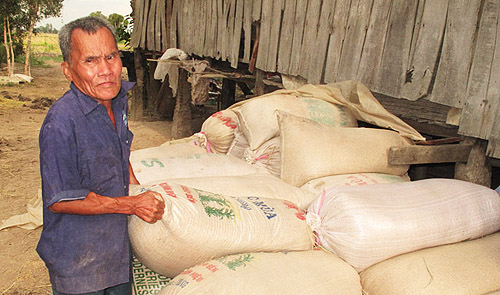The national program for hunger elimination and poverty alleviation in the Mekong Deltea has been a half success for its erasure of hunger, while poverty reduction remains ongoing and needs further effort and investment.
Part 1: Living under poverty in the Mekong Delta granaryPart 2: Poverty from dependence, inadequate land managementPart 3: Effectiveness of poverty allowance a concern Part 4: Hunger erased, but poverty remains in the Delta
Under the plan for poverty alleviation approved by the law-making National Assembly, the central government will spend over VND5 trillion (US$240.4 million) from now till 2015 to pull down the national poverty rate from 9.6 percent to less than 5 percent.
In addition, poor people will continue to benefit from receiving other social welfare programs for education and job training for income increases, healthcare and nutrition, housing, access to legal assistance, land for cultivation, clean water, and costs of electricity supply.
Sustainable poverty alleviation
Mr. To Van Chien, residing in Muong Bay Village in Bac Lieu Province in the Mekong Delta, showed his bank loan book, noting his debt of VND27 million ($1,300), and said, “I will never be able to pay off this debt in my whole life.”
He was granted the amount through a favorable loan for the poor.
As his main income is from catching fish, he can only afford his family’s daily food and so has no savings.
Chien added that the banks only paid out his loan gradually, in VND2 million ($96) payments, which is enough to buy rice to eat but little else.
Mr. Nguyen Van Coi, head of the 18th hamlet in Ca Mau Province’s Thoi Binh District, said the government subsidized planting trees, breeding stock and capital for production, but those who have no land were not granted the allowance.
Coi admitted that 10 out of 40 poor households in his locality will never be able to escape poverty as they have nothing to produce.
Mr. Nguyen Cong Them, an official in Hon Dat District in Kien Giang Province, said half of the 2,000 poor families in the district face an almost impossible struggle to escape poverty.
“Any subsidy given to them is only for hunger elimination,” Them explained.
Master Tran Huu Hiep, head of the economics department of the Steering Committee in the Mekong Delta, said the region has achieved good results in poverty alleviation. The rate of poor households in the region has fallen dramatically, down from 50 percent in the early 1990s to 9.6 percent in 2012.
Among the 62 poor districts nationwide recognized by the government, none are located in the Mekong Delta. However, this does not mean the area sits above the poverty line.
Poverty in the delta does not mean hunger, but the ‘lowest land’ in education and training and quality of the working force. They are not hungry, but steady poverty covers a large population, according to Them.
Poverty in the Mekong Delta comes from a lack of knowledge and capital for production, natural disasters such as storms and floods, and having no land and depending on the State.
A recent survey by the Mekong Delta Development Sesearch Institute shows that households have 0.4 hectares of cultivable land each on average, an amount that will not create wealth with the current means of production.
The number of students dropping out of school early is considered a disaster, Them added.
On the other side, the deciding of which families are under the poverty line has problems, said Nguyen Thi Hong Ha, former deputy director of the Department of Labor, Invalids, and Social Affairs in Tien Giang Province.
The selection is unfair as it is decided by local authorities, who sometimes favor people they are related to. According to regulations, a family with an income of VND400,000 ($20) or less a month is listed as poor, while authorities have no way to identify the true income of locals.
Those who are just above the poverty line are actually the poor, Ha added. An income rate of VND400,000 a month is unsuitable now due to the increased prices of goods.





















































